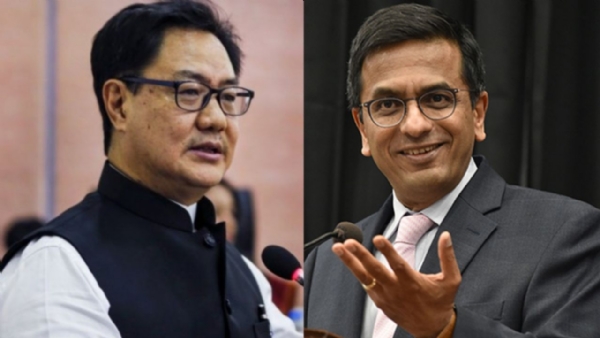Law Minister Rijiju writes to CJI, seeks Govt representatives in SC Collegium
In the letter sent on 16 January 2023, the minister has proposed including representatives from the government in the “evaluation committee” for Supreme Court and High Court judges to dispel the notion that the process for selecting constitutional court judges is opaque.
Total Views |
New Delhi, January 17 : Amid its ongoing 'war of word' between 'Central Government and Supreme Court' over the collegium system, now the central government wrote to Chief Justice of India, D Y Chandrachud “suggesting” the inclusion of a government nominee in the decision-making process for shortlisting of judges.

Pointing out that the Memorandum of Procedure regarding the appointment of judges was still “pending finalisation” Union Law Minister Kiren Rijiju has given “suggestions on how best it can be streamlined."
In the letter sent on 16 January 2023, the minister has proposed including representatives from the government in the “evaluation committee” for Supreme Court and High Court judges to dispel the notion that the process for selecting constitutional court judges is opaque.
Law Minister Kiren Rijiju writes to CJI Chandrachud:
— The Analyzer (News Updates🗞️) (@Indian_Analyzer) January 16, 2023
"We want govt nominee in Collegium Panel for shortlisting SC & HC Judges."
Modi Govt playing in Front Foot against the tyranny of the Supreme Court's judicial appointments🔥
It should be noted, at a present the appointment mechanism as outlined in MoP does not included in the Search-cum-evaluation committee . The MoP were earlier rejected by the CJI-led five-judge collegium, which includes Justices Sanjay Kishan Kaul, K M Joseph, M P Shah, and Ajay Rastogi.
Also Read | VP Dhankar enters collegium system debate, slams SC in presence of CJI for junking NJAC Act
The letter was addressed on the same day a top court bench headed by Justice Sanjay Kishan Kaul expressed “extreme concern” over the government sitting over 10 files related to transfer of judges.
The Supreme Court believes that the proposal to include government representatives in the two-tier judge-selection framework is a new attempt to incorporate backdoor shades of the National Judicial Appointment Commission Act, which was unanimously approved by Parliament but deemed unconstitutional by a five-judge SC bench in October 2015. The NJAC was to be led by the GI and comprised two of the most senior judges, the law minister, and two notable people chosen by a panel consisting of the Prime Minister, the Leader of the Opposition, and the GI.
.
.

